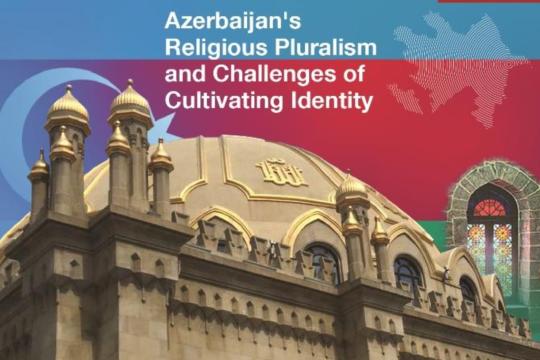
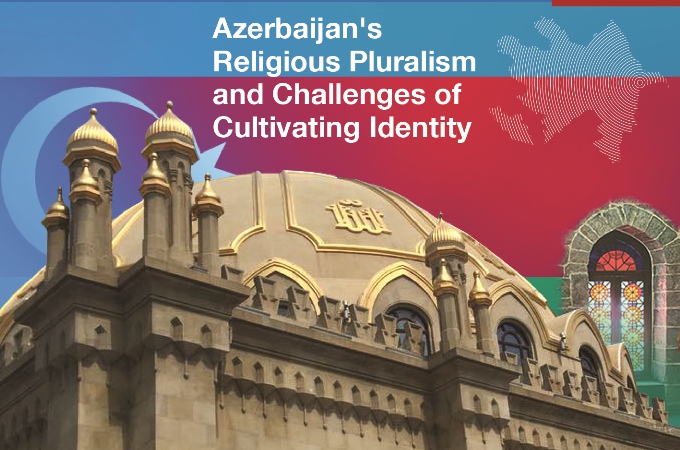 |
| [AlJazeera] |
| Abstract The Azerbaijani experience points to the existence of an interactive situation between social and cultural components, which has led to the emergence of a religious existence that can be called “the Azerbaijan model”. In addition to Shia and Sunni Muslims, who make up the majority of the population, Jews, as well as followers of the Armenian Apostolic Church, Russian Orthodox Church and other religions are all citizens of Azerbaijan. This report discusses “the Azerbaijan model” in terms of levels of coexistence and religious diversity, as well as the challenges faced by the country in terms of this issue. |
Introduction
Most statistics contend that ninety-six per cent of Azerbaijan’s population is Muslim, while the remainder (four per cent) is distributed among other religions, such as Christianity, Judaism and Zoroastrianism. Meanwhile, government officials say that ninety-two per cent of the population is Muslim.(1) Some statistics say that Shia represent eighty-five per cent of the Muslim population, while the percentage of Sunni Muslims is fifteen per cent. But, according to officials running religious affairs in the coutnry, the percentage of Sunni Muslims is actually thirty-five per cent.(2)
The report concludes that the religious situation in Azerbaijan is largely linked to the country’s geopolitical situation and given that it is surrounded by significant actors in the region, including Russia, Turkey and Iran. Although Azerbaijan is secular according to its constitution, Islam is an integral part of its cultural and social identity. Today Azerbaijan is experiencing the formation of a national secular identity in which religion will play a significant role. It is important to note that at the same time, religious institutions in Azerbaijan have embraced a strict policy to prevent the influence of so-called “radical groups”.
Azerbaijan’s history greatly influenced the religions that emerged in a country filled with ancient global heritage, including the remnants of one of the oldest human settlements in Gobustan, which dates back to the Late Stone Age, and is associated with the Guruchay culture and the development of human civilisation. A number of Azerbaijani caves exhibit the cultures of the Upper Paleolithic and the Late Bronze Age. The Achaemenids ruled the region in 550 BC, a period in which Zoroastrianism spread; and one of its temples still exists in Baku. Afterwards, the region became part of Alexander the Great’s empire and successive ruling dynasties, from the Sassanids and Byzantines, to Arab Muslims once Islam reached the country in the seventh century.
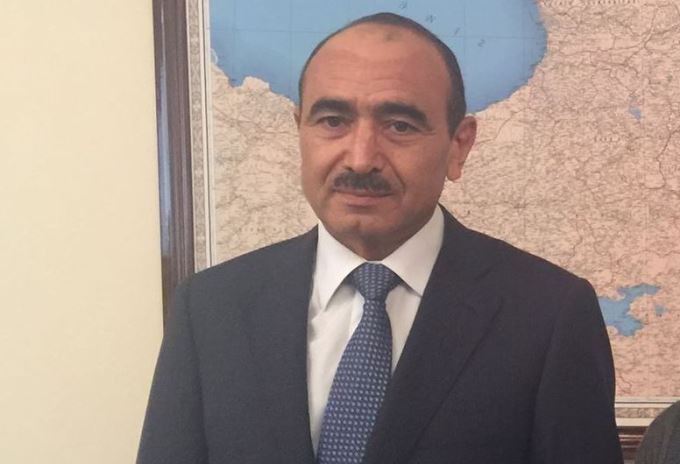 |
| Dr. Ali Hasanov, advisor to Azerbaijan's president [AlJazeera] |
In addition to its geographical location and its population’s diverse national and ethnic composition, favourable conditions contributed to the spread and diversity of religions in Azerbaijan. Several religions are practiced, including Islam, as well as Zoroastrianism, Judaism and Christianity, among others. It is notable from the Azerbaijani experience in this area that these components interact, leading to the emergence of a religious existence that can only be described as “the Azerbaijani model”. Sunni and Shia Muslims make up the foundation and majority in Azerbaijan, with Shia concentrated in the capital Baku and Lankaran and the surrounding villages, and Sunnis concentrated in the north of the country. Jews and followers of the Armenian Apostolic and Russian Orthodox churches, also live in Azerbaijan.
This report is based on interviews conducted by the researcher during her trip to Azerbaijan.(3) It discusses the model of coexistence in the Caucasus region found in Azerbaijan and the challenges faced by the country.
Significant numbers
Several studies on the religious situation in Azerbaijan indicate that more than ninety-nine per cent Azerbaijan’s population is Muslim.(4) However, government sources put the Muslim population at ninety-six per cent. The remaining four per cent of citizens are Christians, Jews, Zoroastrians, atheists or other religions.(5) Under this broad umbrella, Muslim-majority Azerbaijan contains multiple races and cultures and presents a unique model of coexistence and pluralism, one with special features but still following the typical Caucasus model of Islam.
Some Azerbaijani statistics indicate Shia represent eighty-five per cent of the population, while Sunni Muslims are estimated at fifteen per cent.(6) Most of them follow the Twelver school of thought. There are also those who ascribe to the Ismaili group. However, religious affairs officials, most notably the Chair of the Committee for Religious Affairs, Mubariz Gurbani, contend that the percentage of Sunnis in the country exceeds thirty-five per cent.(7)
Soviet era religious fighting
Historically, the relationship between Azerbaijan and the Russians was one of repression and bloodshed associated with occupation and conflict. Religion and the people’s religious freedoms were the first victims of policymakers, especially during the Soviet era. In 1806, Azerbaijan was occupied by Tsarist Russia. In 1918, Azerbaijan declared its independence from Russia, but this independence did not last long given that Azerbaijan was incorporated into the Soviet Union in 1920. Before the Soviet Union, there were two thousand mosques in Azerbaijan; however, Muslims experienced repression and marginalisation, so most mosques closed down in the thirties. Due to the circumstances of the Second World War, only some were allowed to remain open. Azerbaijani Muslims and the Caucasus region in general suffered from an organised Soviet policy to repress religion.(8) In the early eighties, among five big mosques, only two were allowed to open in Baku, and there were only fifteen mosques across all of Azerbaijan. This prompted many of the citizens to secretly conduct prayers and religious activities in their homes. Soviet repression of religious freedom also included Azerbaijan’s neighbours in the South Caucasus, Armenia and Georgia.(9)
After independence
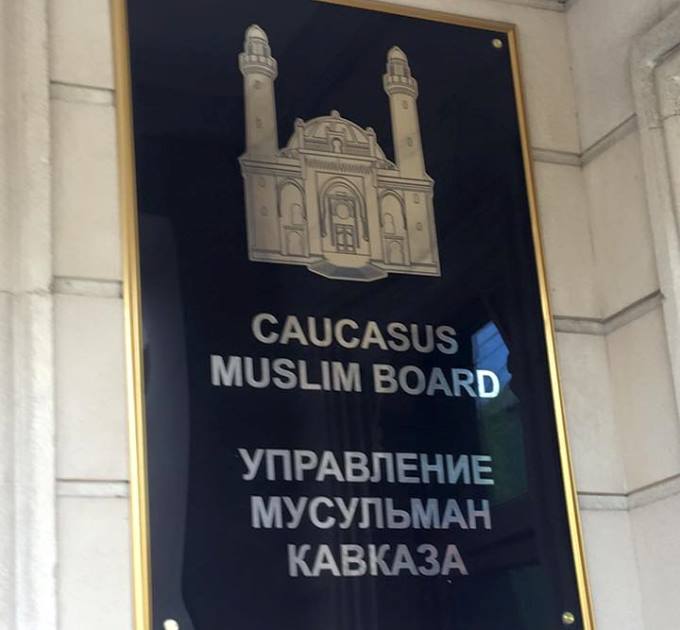 |
| Caucasus Muslim Board, responsible for administering mosques and clerics [AlJazeera] |
After Azerbaijan declared independence, which resulted in a bloody clash with Russia, the number of mosques in Azerbaijan increased noticeably. Several of them were built through the support of Islamic countries such as Iran and Saudi Arabia. This era coincided with the arrival of preachers and the establishment of a religious institute in 1991. However, the conversion of Azerbaijan to a popular destination for preachers had some negative aspects, “as some of them exploited the existing power vacuum and Soviet era effects, with both Sunni and Shia leaders promoting extremist views, something that made their presence unwelcome in Azerbaijan”.(10) In response, the Committee for Religious Affairs, mosque managements and the Department of Muslim Affairs in the Caucasus adopted a strict policy on this issue, one that still holds today.(11)
When Azerbaijan declared independence in 1991, the number of mosques in the country did not exceed seventeen and the population at that time was seven million people. Today, the country has ten million inhabitants and 2,100 mosques.(12) These mosques are not labelled Sunni or Shia; rather, the mosques “exalt the name of God, and Sunni and Shia pray together”.(13) In Gurbani’s opinion, people in the south of Azerbaijan (which today falls within Iran’s border) care about religion more than people in the north of Azerbaijan (Baku).(14) This is the result of several factors, foremost of which is the nature of the relationship between religious and government institutions, and the differing nature of the Iranian and Azerbaijani regimes.
Secularism and Islamic values
It is possible to claim that Azerbaijan is one of the most secular Muslim societies, since the constitution clearly articulates the state’s secularism.(15) Apart from that, it was the first Muslim country to introduce theatre and cinema. Today, the regime in Azerbaijan is one of the most secular in the region, leading some to propose that this has seriously limited extremism(16) in a country whose geopolitical significance in the Caucasus region grows daily.
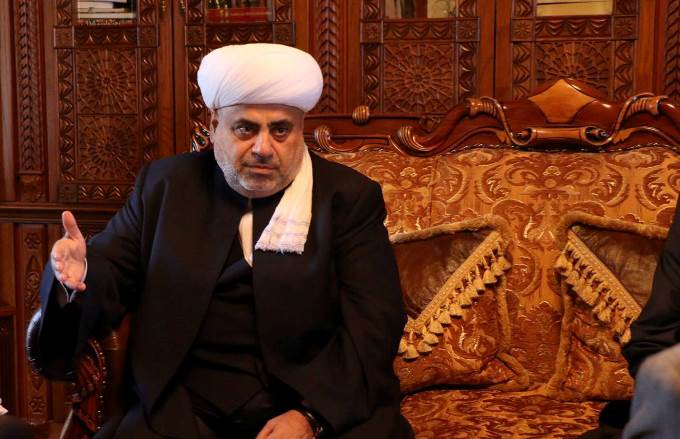 |
| Shaykh Al-Islam of the Caucasus region, Allahshukur Pashazadeh [AlJazeera] |
This secularism has not prevented Islam from increasingly returning to Azerbaijan. This return is described as “good and positive, a reconnection with Islamic values and traditions, after liberating people from seventy years of atheism and Soviet policies, which fought religion in the people’s hearts”.(17) This trend has been accompanied by the rise of Islamic extremist groups with outside influences. Clearly, government efforts in the area of organising the religious situation do not oppose “evoking Islam in the daily lives of people, and you can find many features of it”.(18) From the authorities’ perspective, the most important thing “is to maintain the freedom of belief, to spread Islamic values and to confront extremism and radicalism, whether of Sunni or Shia origin”.(19) It seems that the contributions of religious people and clerics in support of government policies in this area have given power to the country’s secular orientation and enhanced its power within society. This also clearly extends to the educational process and has created a state of intermingling between what seem to be clashing concepts –secularisation and “Islamicisation”.
Curbing influence of foreign du’aat (callers to Islam)
Since 1991, the government has taken some steps to strengthen cooperation with the religious community. They have sought to improve the religious environment and aided in educating young Muslim clerics. This is an attempt to promote Islamic values on the basis of local traditions and cultural dimensions, which should in turn curb the influence of foreign religious groups. Meanwhile, several groups, including independent non-governmental organisations, stress the importance of dialogue, particularly discussions on religion and the state, and devise new ways to cooperate with independent groups that are accepting of religious pluralism.(20)
In recent years, the authority has been on high alert when it came to groups described as radical Islamist groups. The security crackdown meant that quite a few members of these groups were detained for “planning violent acts”. Despite the unique religious pluralism found in Azerbaijan, the country’s religious issues actually seem to be complicated in reality. This is particularly true given that Azerbaijan’s neighbours and allies include countries clearly seeking to export their cultural models (Iran, Turkey, Saudi Arabia, among others).(21) Thus, when Azerbaijan became a destination for many Shia and Sunni clerics, organisations and communities, the government reacted severely, concerned that this posed a challenge to secularism and to society’s security.(22)
Because Azerbaijan is in a strategic geographic location, the regime’s clearly secular orientation has not prevented it from being a target of competition between foreign Islamist groups, regardless of whether they had peaceful or violent tendencies. It could be that extremist groups also target Azerbaijan because of government policies that converged with Western policies. To put the country’s religious environment in perspective, it is important also to consider the rivalry which has emerged in the country between Iranian Shia preachers and their Sunni competitors from Turkey and Saudi Arabia.(23) The government is determined to end these rivalries, dealing with them as a societal threat.(24)
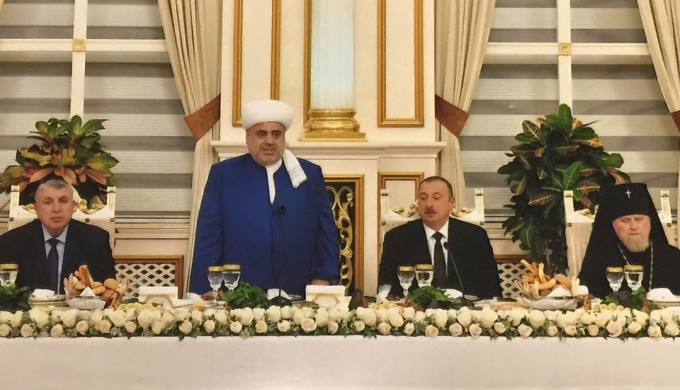 |
| Azerbaijan presents a model of coexistence among adherents of various faiths [AlJazeera] |
Further, in what could be described as a “religious ideology”, religious institutions in Azerbaijan have been trying build a religious model that reduces differences between Shia and Sunni. This has resulted in firm policies against preachers from abroad in order to maintain what is described as “a unique peaceful coexistence among Islamic branches. Azerbaijan may be the only Muslim country in which the followers of two sects pray together in the same mosque, and sometimes even behind the same Imam”.(25) Azerbaijani officials insist on talking about the country as one of peaceful coexistence between representatives of all religions, in addition to national and ethnic minorities, and that this model of tolerance should be encouraged in Europe and throughout the world.(26)
Building identity and religious identity
In Azerbaijan, one often hears phrases such as: “This is the most secular Muslim country in the world”.(27) This phrase seems to be correct to an extent, particularly when observing habits such as how strictly prayers are observed, and the absence of many features that are found in Islamic societies. Despite the presence of veiled women in the streets, they are few compared to the vast majority of women. It is interesting to note that quite a few citizens ask about the obligations relating to acts of worship. For manyAzerbaijan Muslims, Islam represents a particularly spiritual issue, does not affect their loyalty to the state and its secularism, and does not affect their friendly relationships with other religions. According to the Caucasus Barometer, only twenty per cent of Azerbaijanis practice religious rites regularly, and less than forty per cent limit this practice to the holidays.(28) According to another study, less than nine per cent of Azerbaijanis attend religious services once a week or more; fourteen per cent fast; and nineteen per cent pray.(29)
It seems that religion and religiosity are being dismantled, with each holding meaning and significance in Azerbaijan. Alongside all secular aspects, in a country witnessing rapid economic growth, Islam represents an integral part of its social and cultural identity. This is found in its relations and conflict on a number of issues (Russia, Armenia, independence, the occupation of Karabakh), as well as in the conservative traditions within families, in marriage and death ceremonies, and sometimes, implicitly or explicitly, in other aspects of community.
Azerbaijan in one of its forms includes a government plan to form a secular national identity,(30) with religious identity part of the national public identity, through several approaches:
• Developing and providing structures for various groups to feel that they are a part of the state;
• Seeking to obstruct the loyalties outside the state model, for example, dealing with the issue of preachers from abroad;
• Developing a no-tolerance policy towards radical threats.
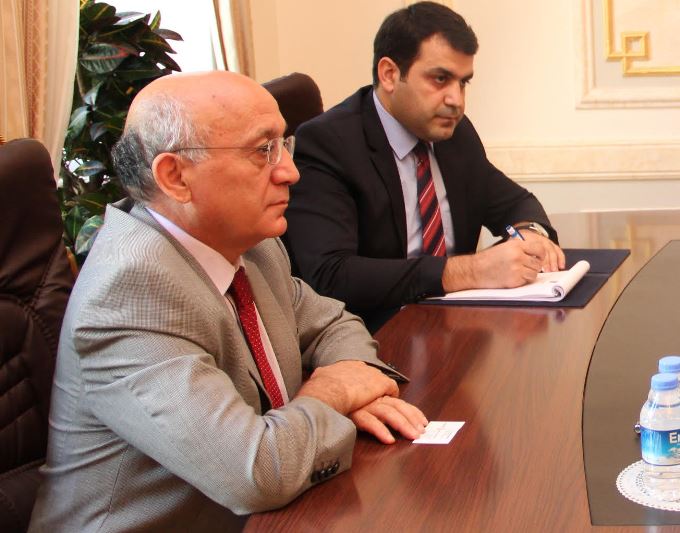 |
| Chair of Azerbaijan's Committee for Religious Affairs, Mubariz Gurbani [AlJazeera] |
These security policies have opened the door for criticism relating to human rights issues, including religious rights. The officials responsible for the religious aspect on this subject argue that this criticism is adopted by Western circles and does not extend to religious freedoms, as far as those dealing strictly with extremist groups. The Chair of the Committee for Religious Affairs, Gurbani, addressed this issue with the following statement:
“We have entered into several discussions with some of organisations on this issue, and we have always replied accurately to the charges, as summarised in the following points. First, Azerbaijan supports religious freedom, but it stands firmly against extremist groups. Second, these reports tend to open the area to extremist groups, so we asked them more than once: What do you want? Do you want to see groups like Daesh (the Islamic State) in Azerbaijan? The answer is: no. Third, in Christianity, there are also extremist groups, and there are legal restrictions against these groups in the West; thus, it is our right to implement restrictions to ensure our security. Finally, our priorities are related to our national interests in the same way the United States and Europe have their national interests, and we do not base our interests on Western reports”.(31)
Conclusion
The religious situation in Azerbaijan appears to be largely linked to the country’s complex geopolitical situation, and the fact that it is surrounded by strong neighbours and political players with clout in the region, such as Russia, Turkey and Iran. The situation is characterised by clashes and overlapping economic and political interests, as well as cultural dimensions and simultaneous cooperation with the West and with the Muslim world.
This complexity obstructs the quest to build Azerbaijan’s overall identity, which throughout history has found itself under the influence of the cultures of the great empires surrounding it. Thus, what can be called the Azerbaijani identity is actually a complex mixture tinged with Iranian, Turkish, Arabic and Russian influences.
In fact, Azerbaijan is one of the republics that became independent after the Soviet Union’s collapse. While there is a Shia majority in the country, making it similar to the Iranian situation, it is also a secular country like Turkey with the Turkish language and ethnicity playing a role in the Azerbaijan identity. Adding yet another dimension to the national identity, Azerbaijan seeks to define itself as a Western country.(32)
With all these secular manifestations in a country that is witnessing rapid economic growth, Islam still represents an integral part of Azerbaijan’s social and cultural identity. Azerbaijan continues to form a national secular identity, one that expresses religious identity as part of a national public identity. Religious institutions in Azerbaijan have adopted a strict policy of building a religious model that reduces the differences between Shia and Sunni, so there are firm policies against preachers from abroad and radical groups to maintain what is described as “a unique, peaceful coexistence” among the various religious factions.
_________________________________________
Copyright © 2015 Al Jazeera Centre for Studies, All rights reserved.
*Dr. Fatima al-Smadi is a senior researcher at AlJazeera Centre for Studies specialising in Iranian affairs. This report is based on her research trip to Azerbaijan in August 2015.
References
(1) Author interview with Azerbaijani presidential adviser, Dr. Ali Hasanov, Baku, 24 August 2015.
(2) Based on information from the author’s meetings with religious affairs leaders in Azerbaijan, 20 – 30 August 2015.
(4) Pew Research Center, “Mapping The Global Muslim Population: A Report on the Size and Distribution of the World’s Muslim Population”, The Pew Forum on Religion and Public Life, October 2009, http://www.pewforum.org/files/2009/10/Muslimpopulation.pdf.
(5) Author interview with Chair of the Committee for Religious Affairs in Azerbaijan, Mubariz Gurbani, Baku, 27 August 2015.
(6) Religion, Administrative Department of the President of the Republic of Azerbaijan, Presidential Library, http://files.preslib.az/projects/remz/pdf_en/atr_din.pdf.
(7) Mubariz Gurbani interview, Baku, 27 August 2015.
(8) Author interview with Shaykh Al-Islam in the Caucasus region, Allahshukur Pashazadeh, 28 August 2015.
(11) Mubariz Gurbani interview, Baku, 27 August 2015.
(12) Some people think that the population of Azerbaijan is nearly fifty million, as they add to the thirty-five million people in “South Azerbaijan” (northern Iran), because they see that Azerbaijan was divided into two parts depending on the treaty signed between Iran and Russia. (From the interview with Gurbani.)
(13) This was confirmed by Shaykh al-Islam Pashazadeh and Chair of the Committee for Religious Affairs Mubariz Gurbani in their interviews with the researcher, and what was heard from worshipers in some mosques in the capital, Baku. Shaykh al-Islam told the researcher that people meet to pray and choose an imam who may be Sunni on one day and Shia on another day, and all worshipers pray behind him.
(14) Gurbani interview, Baku, 27 August 2015.
(15) Article 6 of the Constitution states that Azerbaijan is a secular state; Article 19 states that religion and state are separate and there is equality for all religions before the law.
(16) Cornell, SE (2006). ‘The Politicization of Islam in Azerbaijan’, Central Asia-Caucasus Institute & Silk Road Studies Programme: A Joint Transatlantic Research and Policy Center. http://www.silkroadstudies.org/resources/pdf/SilkRoadPapers/2006_10_SRP_Cornell_Islam-Azerbaijan.pdf.
(17) Shaykh Al-Islam Pashazadeh and Mubariz Gurbani interview.
(20) International Crisis Group, “Azerbaijan: Independent Islam and the State”, Europe Report No 191, 25 March 2008, http://www.crisisgroup.org/~/media/Files/europe/191_azerbaijan_independent_islam_and_the_state.pdf.
(22) Shaykh Al-Islam Pashazadeh and Mubariz Gurbani interview.
(23) Raoul Motika, “Islam in Post-Soviet Azerbaijan”, Archives de sciences sociales des religions, 115:2011, 111–124.
(24) Shahla Sultanova, “Azerbaijan: Islam Comes with a Secular Face”, EurasiaNet's Weekly Digest, 15 August 2013, http://www.eurasianet.org/node/67396.
(25) Shaykh al-Islam interview.
(27) Dr. Ali Hasanov interview.
(28) Caucasus Barometer, “Attendance of Religious Services: Time-series dataset Azerbaijan”, Caucasus Barometer, 2015, http://caucasusbarometer.org.
(29) Charles Robia, “Religiosity and Trust in Religious Institutions: Tales from the South Caucasus (Armenia, Azerbaijan and Georgia)”, Berkeley Program in Eurasian and East European Studies, 2015, http://escholarship.org/uc/item/1b88b59g#page-2.
(30) European Democracy, “Secularism in Azerbaijan and the threat of radicalisation in the region”, European Democracy, 15 June 2015, http://europeandemocracy.eu/wp-content/uploads/2015/06/EFD-Azerbaijan-light.pdf.
(32) Kamal Makili-Aliyev, “Azerbaijan’s Foreign Policy: Between East and West”, IAI Working Papers, 1305, 25 January 2013, 1–14, http://www.iai.it/sites/default/files/iaiwp1305.pdf.